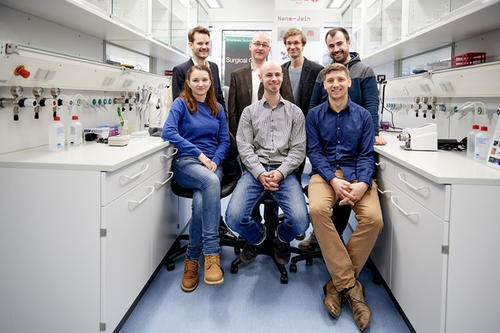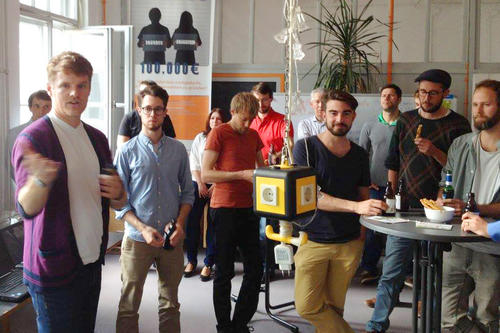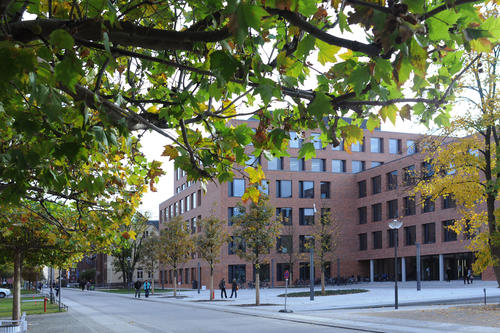Programs, Competitions and Scholarships
Thus among the Berlin universities, there are jointly developed programs, competitions, and scholarships that make students and researchers aware of a start-up project and qualify them for it. In this manner, the universities support founders in developing a business plan or in further developing a prototype or a process similar to prototypes.
Each of the universities has a service unit to facilitate the transfer of ideas from the research sector to the market. At Freie Universität it is Profund Innovation, at Technische Universität Berlin it is the Centre for Entrepreneurship, at Humboldt-Universität it is Humboldt-Innovation GmbH, and at Charité it is the Technology Transfer Office.
With the Berlin Startup Scholarship, Freie Universität Berlin, Technische Universität Berlin, Charité – Universitätsmedizin Berlin, and Humboldt-Universität zu Berlin support founders who want to implement innovative technology-based business ideas. The program is financed with funds from the Berlin Senate Administration for Economics, Technology, and Research as well as the European Social Fund.
With the EXIST Founder Scholarship from the German Federal Government, innovative technology- or science-based start-up projects are funded for a year with up to 143,000 euros which cover the cost of living, cost of materials, and coaching. In Berlin Humboldt Universität, Technische Universität, and Freie Universität are part of the scholarship program.
In addition, Charité – Universitätsmedizin Berlin and Freie Universität are partners in the project Entrepreneurial Network University, a strategy concept to establish a university-wide start-up culture. For this, the German Federal Ministry of Economics and Technology awarded the title “EXIST Entrepreneur University” to the concept of Charité and Freie Universität. Technishe Universität Berlin also received this title for its start-up support in the Centre für Entrepreneurship. Connected to this award is funding that, among other things, supports universities in developing the potential for technology-oriented and knowledge-based start-ups.
Founder Centers Close to Campus
High-tech enterprises require space to grow – and that close to campuses, if possible. Therefore, the universities cooperate with the Technology and Founder Centers run by WISTA Management GmbH: Technische Universität with the Charlottenburg Innovations Center and Humboldt Universität with the Technology and Founder Center in Adlershof. Not far from Freie Universität and the Charité Benjamin Franklin campus, the FUBIC – will be completed by 2021 – the name stands for “Business and Innovation Center next to Freie Universität Campus.” It is expected that 60 to 80 enterprises with about 1,000 employees will move in there.
Image Credit: Simulation: Numrich Albrecht Klumpp Gesellschaft von Architekten mbH / Image editing: Bernd Wannenmacher
Inkulab - the Communal Laboratory
In all four institutions, start-ups from the Life Sciences, the environmentally compatible so-called green chemistry and nanotechnology can already use laboratory space on the campus to develop products in the pre-start-up phase. At Technische Universität Berlin, for example, the laboratory container Inkulab is available for this purpose. It is a communal project WISTA-Management GmbH, the Centre for Entrepreneurship, and the Exzellence Cluster UniCat. Another cooperation partner is the spin-off of Technische Universität, DexLeChem GmbH.
Image Credit: TU Berlin / UniCat / Philipp Arnoldt
Networking at “Berliner Gründl”
Personnel, business plan, financing – it is often very helpful for founders to exchange views on such topics. Developing and nurturing networks and partnerships is therefore often an important building block for start-up support. The start-up service of Humboldt-Universität holds a monthly event, “Berliner Gründl,” a meeting to network, make presentations, and ask questions.
Image Credit: Humboldt-Innovation GmbH
First Aid for Founding at Charité
When scientists found enterprises, they are confronted with previously unknown requirements and ground rules. The founding services of the universities provide the necessary qualifications in workshops, lectures, seminars, coaching sessions, and competitions. The Technology Transfer Office of Charité for example offers special workshops on the rules and framework conditions for the approval of products in the health care market.




